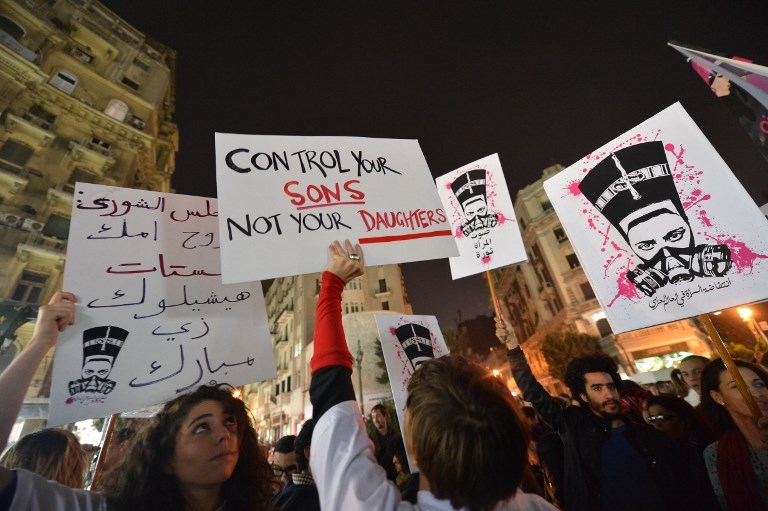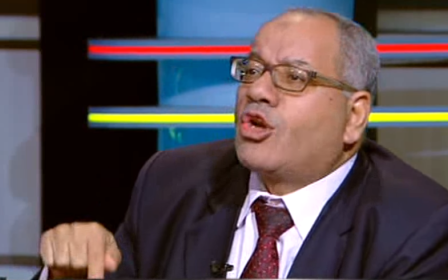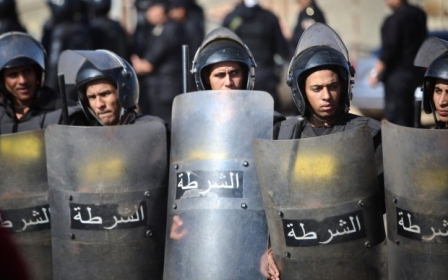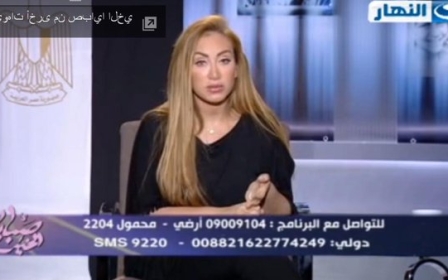#FreeAmal: Egyptian woman's detention extended for harassment protest

Egyptian activist Amal Fathy has had her detention extended for a fifth time without trial for speaking out against sexual harassment, sparking outrage amid supporters.
Fathy, 33, was told on Tuesday that she will now be held until 15 July when her pre-trial detention will be reviewed. By that stage she will have been detained for more than two months at Qanater's women's prison in Cairo.
Social media users on Twitter have called for her release, using the hashtag #FreeAmal amid reports of a deterioration in her health. Fathy has been diagnosed with paralysis in her left leg. A doctor has also asked that she see a psychiatrist.
Amnesty International has said it fears her detention could last months or even years. Najia Bounaim, its North Africa campaigns director, said: “It is a dark day when Egyptian authorities are more concerned with silencing a woman who speaks out about sexual harassment than taking steps to address the issue.”
In a 12-minute video she posted on Facebook in May, Fathy explains how she was sexually harassed twice on the same day and criticises the Egyptian government for its lack of progress on addressing the issue.
In the first instance, she says, she was harassed by a taxi driver who "kept adjusting his mirror to look at me and made disgusting comments towards me". Fathy also describes how a bank adviser sexually harassed her while trying to sort out a credit issue.
"We were better off 70 years ago," she says, adding that "women used to walk around in miniskirts and if someone was to even look at her, she could just call an officer and they would take him to court.
“It’s infuriating, those that blame the way that women dress. Women dressed the same way 70 years ago, this didn’t happen then."
Charges faced by Fathy
Police stormed and searched Fathy’s home in Maadi in Cairo on 11 May. She was then held at Maadi police station in Cairo, along with her husband and three-year old child, who were both later released.
Fathy was charged with “disseminating a video on social media to publicly incite overthrowing the government"; "publishing a video that includes false news that could harm public peace”; and “misusing telecommunication tools”.
Fathy is also being held on pre-trial detention in another case for “using a website to promote ideas calling for terrorist attacks”; “intentionally disseminating false news that could harm public security and interest”; and “belonging to a banned group”.
The allegations of "belonging to a banned group" are related to Fathy’s membership of the April 6 Youth Movement, which played a significant role in organising the 2011 uprisings against then-Egyptian president Hosni Mubarak. The movement was banned by Egypt's Court of Urgent Matters in April 2014.
Fathy’s family pledged bail of 10,000 EGP (around $560) to secure release her on 19 June but the move was rejected by the South Cairo Criminal Court.
Sexual harassment still a problem
Sexual harassment in Egypt is an increasing issue: a United Nations report in 2013 said that 99.3 percent of women in Egypt have experienced some form of sexual harassment.
Despite several anti-harassment movements, a report by Human Rights Watch five years later still found that “sexual harassment and violence against women remained endemic” in the country.
A poll conducted by the Thomson Reuters Foundation also reported in 2017 that Cairo was one of the most dangerous cities in the world for women.
Arbitrary detentions of activists are not uncommon in Egypt. The Committee to Protect Journalists has reported that at least 20 journalists have been imprisoned since the government of President Abdel Fattah al-Sisi came to power through a military coup in 2013.
A report from Human Rights Watch has also recorded a wave of arrests of Sisi’s critics since May 2018, with charges appearing to be based on their social media posts and activism.
Those arrested include political activist Hazem Abd al-Azim who was detained on 27 May, prominent journalist Wael Abbas who was detained on 23 May, surgeon Shady al-Ghazaly Harb, lawyer Haitham Mohamadeen, and satirist Shady Abu Zaid.
Human rights observers have reported an increase in arrests since Sisi was re-elected in March with 97 percent of the vote.
Sarah Leah Whitson, Middle East and North Africa director at Human Rights Watch said: "The message is clear that criticism and even mild satire apparently earn Egyptians an immediate trip to prison.”
New MEE newsletter: Jerusalem Dispatch
Sign up to get the latest insights and analysis on Israel-Palestine, alongside Turkey Unpacked and other MEE newsletters
Middle East Eye delivers independent and unrivalled coverage and analysis of the Middle East, North Africa and beyond. To learn more about republishing this content and the associated fees, please fill out this form. More about MEE can be found here.




